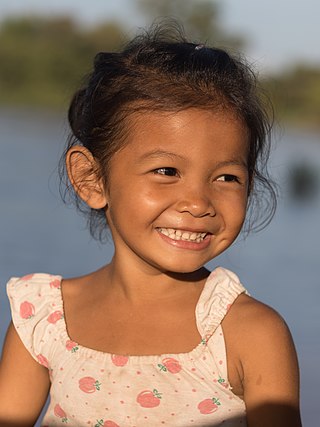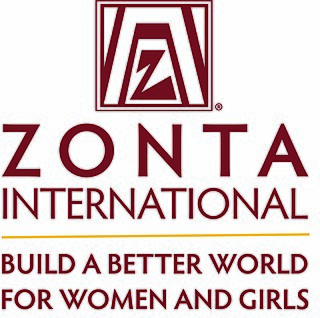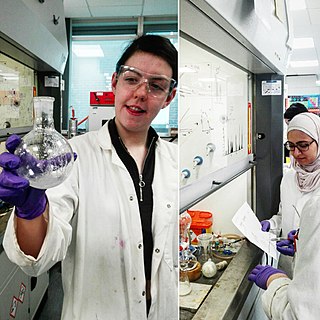
International Women's Day (IWD) is a holiday celebrated annually on March 8 as a focal point in the women's rights movement. IWD gives focus to issues such as gender equality, reproductive rights, and violence and abuse against women. Spurred by the universal female suffrage movement, IWD originated from labor movements in North America and Europe during the early 20th century.
Women's health differs from that of men's health in many unique ways. Women's health is an example of population health, where health is defined by the World Health Organisation as "a state of complete physical, mental and social well-being and not merely the absence of disease or infirmity". Often treated as simply women's reproductive health, many groups argue for a broader definition pertaining to the overall health of women, better expressed as "The health of women". These differences are further exacerbated in developing countries where women, whose health includes both their risks and experiences, are further disadvantaged.

World Toilet Day (WTD) is an official United Nations international observance day on 19 November to inspire action to tackle the global sanitation crisis. Worldwide, 4.2 billion people live without "safely managed sanitation" and around 673 million people practice open defecation. Sustainable Development Goal 6 aims to "Ensure availability and sustainable management of water and sanitation for all". In particular, target 6.2 is to "End open defecation and provide access to sanitation and hygiene". When the Sustainable Development Goals Report 2020 was published, United Nations Secretary-General António Guterres said, "Today, Sustainable Development Goal 6 is badly off track" and it "is hindering progress on the 2030 Agenda, the realization of human rights and the achievement of peace and security around the world".
Gender equality, also known as sexual equality or equality of the sexes, is the state of equal ease of access to resources and opportunities regardless of gender, including economic participation and decision-making; and the state of valuing different behaviors, aspirations and needs equally, regardless of gender.

The Convention on the Elimination of all Forms of Discrimination Against Women (CEDAW) is an international treaty adopted in 1979 by the United Nations General Assembly. Described as an international bill of rights for women, it was instituted on 3 September 1981 and has been ratified by 189 states. Over fifty countries that have ratified the convention have done so subject to certain declarations, reservations, and objections, including 38 countries who rejected the enforcement article 29, which addresses means of settlement for disputes concerning the interpretation or application of the convention. Australia's declaration noted the limitations on central government power resulting from its federal constitutional system. The United States and Palau have signed, but not ratified the treaty. The Holy See, Iran, Somalia, Sudan, and Tonga are not signatories to CEDAW.

A girl is a young female human, usually a child or an adolescent. When a girl becomes an adult, she is generally referred to as a woman. However, the term girl is also used for other meanings, including young woman, and is sometimes used as a synonym for daughter or girlfriend regardless of age. In certain contexts, the usage of the term girl for an adult woman may be considered derogatory. Girl may also be a term of endearment used by an adult, usually a woman, to designate adult female friends. Girl also appears in compounds like showgirl, cowgirl, and schoolgirl.
United Nations Security Council Resolution 1325 (S/RES/1325), on women, peace, and security, was adopted unanimously by the UN Security Council on 31 October 2000, after recalling resolutions 1261 (1999), 1265 (1999), 1296 (2000), and 1314 (2000). The resolution acknowledged the disproportionate and unique impact of armed conflict on women and girls. It calls for the adoption of a gender perspective to consider the special needs of women and girls during conflict, repatriation and resettlement, rehabilitation, reintegration, and post-conflict reconstruction.

The Fourth World Conference on Women: Action for Equality, Development and Peace was the name given for a conference convened by the United Nations during 4–15 September 1995 in Beijing, China.

Zonta International is an international service organization with the mission of Building a Better World for Women and Girls, in support of Sustainable Development Goal 5.
International Women's Year (IWY) was the name given to 1975 by the United Nations. Since that year March 8 has been celebrated as International Women's Day, and the United Nations Decade for Women, from 1976 to 1985, was also established.
International Day of Zero Tolerance for Female Genital Mutilation is a United Nations-sponsored annual awareness day that takes place on February 6 as part of the UN's efforts to eradicate female genital mutilation. It was first introduced in 2003.

The Center for Women's Global Leadership, based at Rutgers University, was founded in 1989 by Charlotte Bunch, the former executive director and an internationally renowned activist for women's human rights. Executive Director Krishanti Dharmaraj is also the founder of the Dignity Index and co-founder of WILD for Human Rights and the Sri Lanka Children's Fund. The former executive director, Radhika Balakrishnan, is now the faculty director, and a professor in the Department of Women's and Gender Studies at Rutgers, chair of the Board of the US Human Rights Network, and a board member of the Center for Constitutional Rights. Located on Douglass Residential College at Rutgers University, CWGL is a unit of International Programs within the School of Arts and Sciences and is a member of the Institute for Women's Leadership, a consortium of women's programs at Rutgers.

Discussions of LGBT rights at the United Nations have included resolutions and joint statements in the United Nations General Assembly and the United Nations Human Rights Council (UNHRC), attention to the expert-led human rights mechanisms, as well as by the UN Agencies.
Because I Am a Girl is an international movement by the aid organization Plan. The campaign is made to address the issue of gender discrimination around the world. The goal of the campaign is to promote the rights of girls and bring millions of girls out of poverty around the world. It is part of the organization's broader international development work. The campaign focuses on lack of equality faced by girls in developing countries and promotes projects to improve opportunities for girls in education, medical care, family planning, legal rights, and other areas.
The United Nations Entity for Gender Equality and the Empowerment of Women, also known as UN Women, is a United Nations entity charged with working for gender equality and the empowerment of women. UN Women is charged with advocating for the rights of women and girls, and focusing on a number of issues, including violence against women and violence against LGBT people.
The Secretary's Office of Global Women's Issues is located within the United States Department of State. In 2009, Melanne Verveer was appointed to be the first Ambassador-at-Large for Global Women's Issues. From September 2013 to May, 2017, Catherine M. Russell was appointed to this position. From May 2017 through December 2019, there was no ambassador for this office. Kelley Currie, a political appointee, joined the Global Women's Issues Office as U.S. Ambassador-at-Large in January 2020. Geeta Rao Gupta is the current Ambassador-at-Large for the office as of May 18, 2023.
Aisling Swaine is an associate professor of practice of international affairs, focusing on women, security and development at the Elliott School of International Affairs of the George Washington University.
Dr. Shruti Kapoor is an Indian economist, women's rights activist, and social entrepreneur.

The International Day of Women and Girls in Science is an annual observance adopted by the United Nations General Assembly to promote the full and equal access and participation of women in Science, Technology, Engineering and Mathematics (STEM) fields. The United Nations General Assembly passed resolution 70/212 on 22 December 2015, which proclaimed the 11th day of February as the annual commemoration of the observance. A theme is selected annually to highlight a particular focus and area of discussion around a focus point for gender equality in science.










